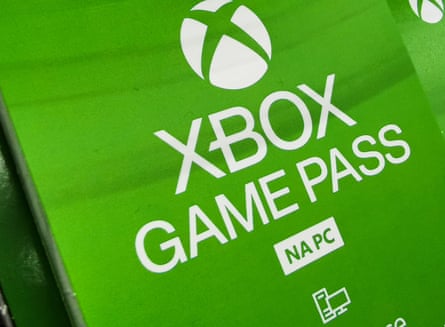TechScape: With a $67bn takeover in the works, is it finally game on for Microsoft? | Technology
Microsoft is the forgotten tech giant. Despite being the world’s second-largest public company by market capitalisation, it got left out of the snappy acronym for the big five – FAANG – alongside Facebook, Amazon, Apple and Google, in favour of Netflix, a company seven percent its size. Even when you add them to the equation (and GAFAM seems the most popular ordering, though given Google and Facebook’s rebrands to Alphabet and Meta, it should really be MAMAA), Microsoft has avoided the scrutiny its peers have been subjected to.
Part of that is to do with where the companies make their profits. Microsoft’s consumer brands are large and popular, but don’t feel like unstoppable behemoths compared to the rest of the MAMAAs. Amazon towers over e-commerce; Meta owns social networking; Alphabet dominates web browsers, email, and search; while Apple practically prints money with a phone that can credibly be called the most successful consumer product ever released. Microsoft, though, makes its money through enterprise sales and cloud computing, and its unbroken power over desktop operating systems seems like a relic of the past rather than a meaningful focus of attention in the present.
The company has been making the most of that state of affairs. Its president, Brad Smith, the second most powerful person at the company after chief executive Satya Nadella, has gained a reputation for being the leader of the pro-regulation forces of the tech industry. When we met in the hazy past of 2019, he warned that the sector would soon feel the backlash of years of acting like “if it’s legal, it’s acceptable” and, a few months later, he targeted Apple for taking a cut of up to 30% of all economic activity on the iPhone.
The same strategy sees Microsoft lean in to the markets where it trails the competition, endorsing policies and practices that cost it little but its competitors lots. In February 2021, Smith endorsed an Australian proposal requiring payments for news content, accepting a small cost for Microsoft’s Bing to support a massive one for Google. Two months after that, the company put pressure on Apple and its massive App Store profits by abolishing its own Windows app store fees.

For a while, the approach worked. Compare two acquisitions: in 2021, Facebook tried to buy a VR developer called Within, which makes a popular fitness app for Oculus called Supernatural. The deal was valued at just $400m, a tiny amount for a Facebook acquisition but a large payout for a company with one major product in a fairly niche sector. Nonetheless, the Federal Trade Commission (FTC) in the US sued to stop it in July this year, arguing that “Meta is trying to buy its way to the top”.
Just a few months before the Within acquisition, however, Microsoft had successfully pulled off a much bigger coup: spending $7.5bn to acquire ZeniMax, the video game publisher that owns properties including Skyrim, Doom and Fallout. The deal went off without a hitch, giving Microsoft a flagship set of first-party developers and hundreds of titles to offer for free to subscribers of its Xbox Game Pass service.
Siren call
Now, though, Microsoft’s non-stick coating is rubbing off. In January 2022, the company announced another planned acquisition, and it was a monster: a $68.7bn cash purchase of Activision Blizzard, the titan publisher of World of Warcraft, Candy Crush, Starcraft and Call of Duty.
It clearly expected the acquisition to go through as smoothly as the ZeniMax purchase had. Despite the clear strategic benefits, the purchase felt like an impulse buy, taking advantage of a sinking stock price at the company following months of legal wrangling over a sexual harassment scandal, as well as weak financial results from Activision Blizzard itself.
Instead, Microsoft found itself plunged into a morass of investigations the world over. The EU competition commission, the UK’s Competition and Markets Authority, and the FTC have all started investigations into the takeover, and in December, the FTC moved to block it. The first pretrial hearing in that case starts today, 3 January.
The purchase isn’t controversial just because of the cost of the buyout, but also because of one game: Call of Duty. The military shooter series is one of the most commercially successful game series of all time. Few other titles are guaranteed as many sales, and those that are, like Grand Theft Auto or The Legend of Zelda, are rare entries in the release calendar, averaging two or so publications a decade.
Call of Duty, by contrast, is a machine that Activision has rebuilt itself to power. Three development studios rotate producing one new entry every year, with a host of smaller units providing support in roles like asset creation and play testing, and a new massively successful free-to-play Fortnite competitor, Warzone, bolted on top of the whole thing. The cinematic single-player campaigns are renowned for being interactive blockbusters, but the multiplayer mode are where the series dominates.
There are other benefits to buying the company. Microsoft could use King, the Activision Blizzard subsidiary that makes Candy Crush, to get a foothold in mobile gaming, or take the nine million players who still subscribe to World of Warcraft and bring them into the Game Pass ecosystem. But at its heart, the purchase is about Call of Duty – and, specifically, Game Pass.

Microsoft has been very clear about what it’s not trying to do. It’s not trying to make Call of Duty an Xbox exclusive. The company has committed to signing a “consent decree”, if the FTC will accept it, which would bind it to offering the game on other platforms. And it’s already made a deal with Nintendo to bring the series to the Switch, the first to be available on a Nintendo console since Ghosts in 2013.
But speaking to industry insiders, the fear on the part of Microsoft’s competitors – chiefly Sony, which makes the PlayStation – isn’t about exclusivity narrowly defined. Instead, it’s about what happens to the industry if Xbox becomes the best place to play Call of Duty, either because it’s developed for those platforms and ported to others half-heartedly, or simply because it’s available for free with Game Pass on Xbox and for a £70 price tag on PlayStation.
They worry that, the centre of gravity of online gaming would gradually shift to Xbox: first taking the Call of Duty players, then taking the people who play other games with them, and then taking anyone who plays games online at all.
It might be hard to feel too sorry for Sony, a company that indisputably is the market leader in home consoles and has used its heft to win battles before, but regulators are paying attention. After half a decade of being the gentle giant everyone loves to forget, might 2023 be the year Microsoft remembers why its competitors all live in fear of antitrust enforcement?
If you want to read the complete version of the newsletter please subscribe to receive TechScape in your inbox every Tuesday.








Gloss